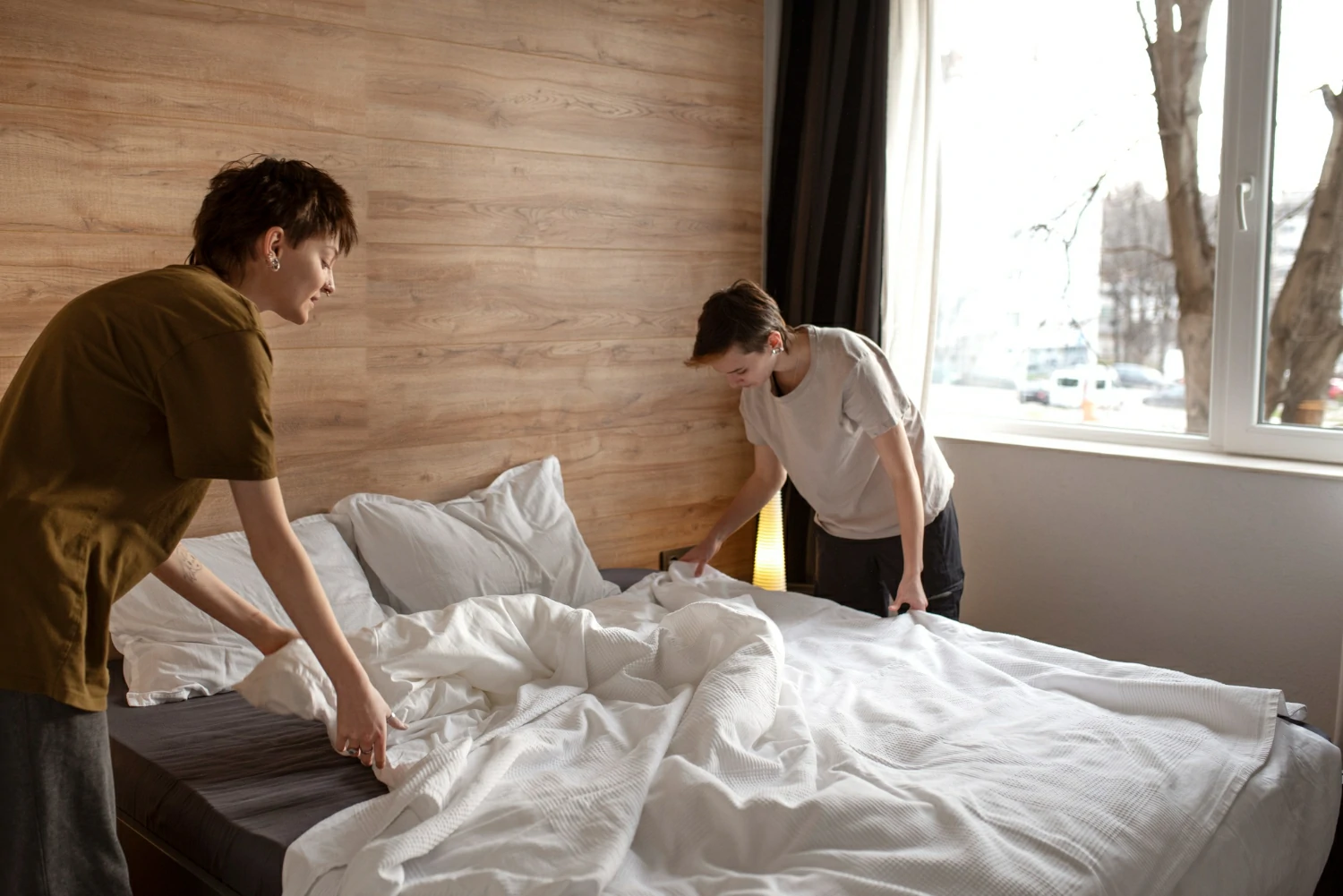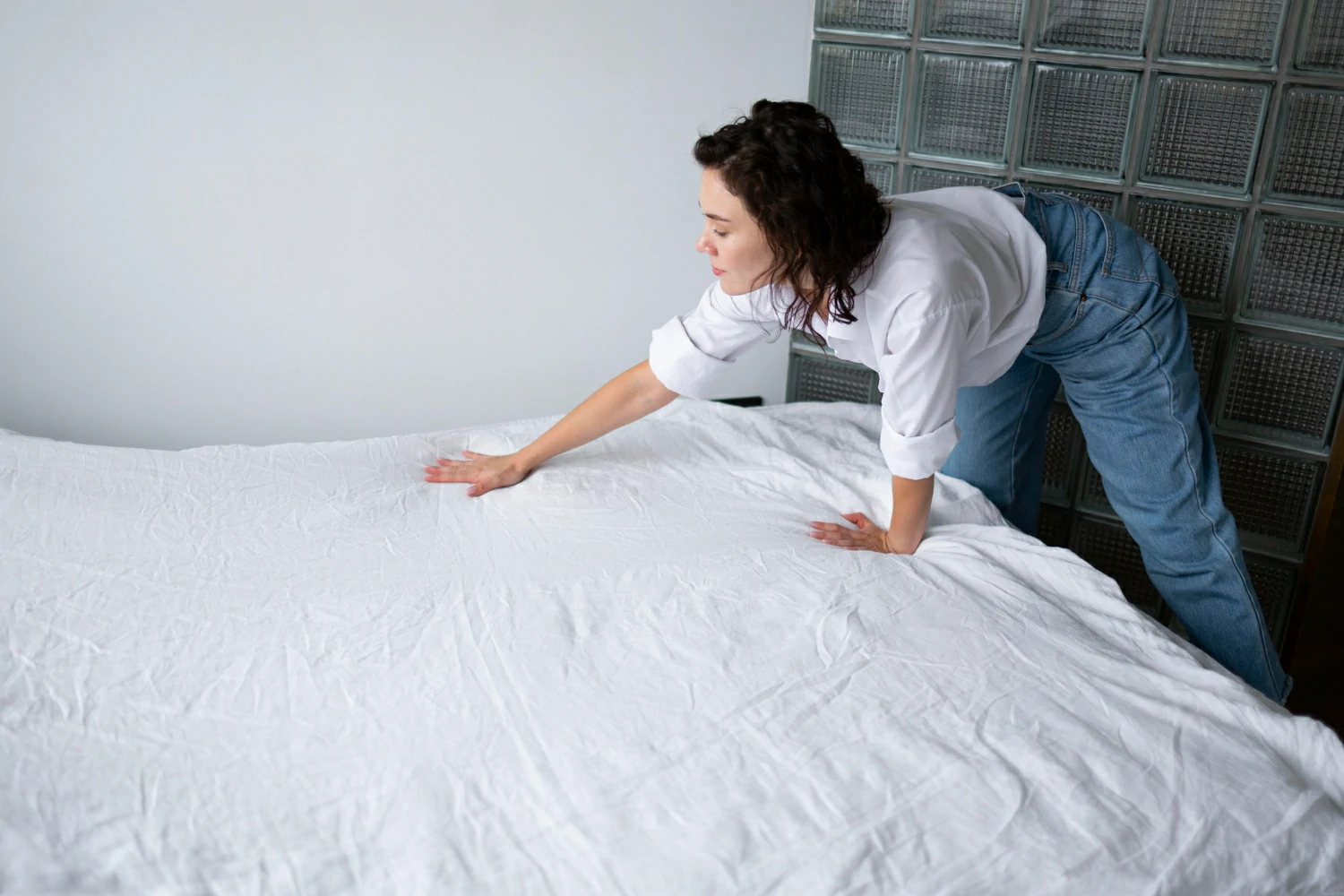Can you sue a hotel for bed bugs? Answer is – Yes, you can sue a hotel for bed bugs. Hotels are legally obligated to provide safe and sanitary accommodations for their guests. If a hotel is negligent and you suffer damages due to a bed bug infestation, you could have a case for a premises liability lawsuit.
Summary
- Hotels have a “duty of care” to keep their premises free of hazards, including bed bugs.
- To win a case, you’ll need to prove the hotel was negligent (didn’t take reasonable steps to prevent or fix the infestation).
- Evidence is key – this includes photos of bites, medical records, proof of the infestation, etc.
- Damages you might be able to claim include medical expenses, lost wages, property damage, and emotional distress.
Can You Sue a Hotel for Bed Bugs?

You’re settling into a cozy hotel room after a long day of travel, ready for a restful night. Suddenly, you notice an itchy red bump on your skin. Then another. And another. The sinking realization hits you – bed bugs. These tiny pests can turn your dream vacation into a nightmare, leaving you with physical discomfort, emotional distress, and even financial burdens.
What are bed bugs?
Bed bugs (Cimex lectularius) are small, reddish-brown insects that feed on the blood of humans and animals.
They are remarkably resilient and adept at hiding, often found in cracks and crevices of mattresses, box springs, bed frames, furniture, and even luggage.
While bed bugs were nearly eradicated mid-20th century, infestations have surged in recent decades due to factors like increased travel and pesticide resistance.
The dangers of bed bug bites
While bed bugs are not known to transmit diseases, their bites can have an array of negative consequences:
Itching and skin irritation: The most common symptom of bed bug bites are itchy, red welts that often appear in a line or cluster. The itching can range from mild to severe, causing significant discomfort and sleep disturbance.
Allergic reactions: Some individuals may experience more severe allergic reactions to bed bug bites. This can include swelling, hives, blistering, and even anaphylaxis in rare cases. If you experience difficulty breathing, dizziness, or swelling of the face or throat, seek emergency medical attention immediately.
Secondary infections: Excessive scratching of bed bug bites can break the skin, increasing the risk of secondary bacterial infections like impetigo or cellulitis.
Psychological impact: Bed bug infestations can lead to anxiety, stress, insomnia, and even feelings of shame or social isolation. The constant worry and fear of being bitten again can have a significant impact on mental well-being.
Financial costs: Dealing with a bed bug infestation can be costly. You may need to replace infested mattresses, furniture, or clothing. Extermination services can also be expensive, especially for severe infestations.
Can You Sue a Hotel for Bed Bugs?

Yes, in most cases, you can sue a hotel if you experience harm due to a bed bug infestation during your stay. The foundation of such a lawsuit rests on the concept of premises liability.
1. Understanding Premises Liability Laws
Premises liability laws dictate that property owners, including hotels, have a legal responsibility to maintain their premises in a reasonably safe condition for guests and visitors.
This duty extends to protecting guests from foreseeable dangers, which can include pest infestations like bed bugs.
2. The Hotel’s Duty of Care
Hotels have a specific ‘duty of care’ towards their guests. This means they are obligated to:
Regularly inspect for pests: Hotels should have proactive pest management protocols that include routine inspections of rooms, common areas, and furniture.
Address infestations promptly: Upon discovering a bed bug infestation, hotels must take immediate and thorough action to eradicate the problem and prevent it from spreading. This may involve hiring professional exterminators, replacing infested items, and potentially treating surrounding rooms.
Warn guests of known risks: If a hotel has knowledge of an ongoing or recent bed bug issue, they may have a duty to inform potential guests of the risk.
3. Proving Negligence on the Part of the Hotel
To establish grounds for a successful lawsuit, you’ll need to demonstrate that the hotel was negligent in their duty of care. This entails proving:
The hotel knew or should have known about the infestation: You might be able to establish this through pest control records, online reviews mentioning bed bugs, or witness statements from other guests or staff.
The hotel failed to take reasonable actions: Did the hotel neglect regular inspections? Did they respond inadequately to reports of bed bugs? Evidence of these failures strengthens your case.
The hotel’s negligence caused your damages: This is where you document the harm you suffered, including medical expenses, lost wages due to time off work, property damage (like replacing infested luggage), and emotional distress.
What to Do if You Find Bed Bugs in Your Hotel Room

1. Documenting the evidence
Thorough documentation is your most powerful tool, whether you plan to simply get a refund or consider a lawsuit. Here’s how to gather evidence:
Take photos and videos
Use your smartphone to capture clear images and videos of:
- Live bed bugs or cast skins (if you find them)
- Bloodstains and fecal spots on bedding, mattresses, or furniture
- Your bed bug bites
Collect samples (if possible)
If it’s safe to do so, carefully collect a specimen or two of the insects. Place them in a sealed container like a plastic bag or a small jar. This can help confirm that you’re indeed dealing with bed bugs.
Get medical attention
If your bites are severe, itchy, or show signs of infection, visit a doctor or urgent care clinic. Document your visit and obtain medical records detailing the bites and any prescribed treatment. This can support a future claim for damages.
2. Notifying the hotel
Alert the hotel management immediately. Do this calmly but firmly. Here’s what you need to do:
Request a room change: Demand to be moved to a different room, preferably on a different floor and away from the infested room. Insist that the hotel inspect the new room before you move in.
Ask for an incident report: Many hotels have standard procedures for bed bug incidents. Request that an official report is filed, and make sure you receive a copy.
Minimize the risk of spreading: If possible, ask the hotel staff to seal your luggage in plastic bags to prevent further contamination. Thoroughly inspect your belongings before leaving the hotel.
3. Contacting a lawyer
If you’ve suffered significant bites, medical expenses, property damage, or emotional distress, consulting with an attorney who specializes in personal injury and bed bug lawsuits is important. A lawyer can:
Assess the strength of your case: An attorney will analyze the evidence, review applicable laws in your state, and determine your chances of success in a lawsuit.
Help preserve evidence: A lawyer may advise you immediately send a preservation of evidence letter to the hotel, ensuring they retain pest control records, room inspection logs, and other relevant documents.
Guide you through the legal process: If you decide to go ahead with a lawsuit, an attorney will file the formal complaint, handle negotiations with the hotel or their insurance company, and represent you in court if needed.
What Damages Can You Claim in a Bed Bug Lawsuit?

1. Medical expenses
Bed bug bites can lead to a range of medical costs including:
Doctor visits or urgent care: Costs for consultations, diagnoses, and any prescribed medications.
Treatment for allergic reactions: This may involve antihistamines, topical creams, or in severe cases, stronger medications to manage swelling and allergic responses.
Treatment for secondary infections: If bites become infected, you may need antibiotics or other medical interventions.
Therapy and counseling: The psychological impact of a bed bug infestation can necessitate mental health support.
2. Lost wages
Depending on the severity of the infestation, you may have incurred lost income due to:
Time off work for medical appointments: If bites require doctor visits or ongoing treatment, those appointments may interfere with your work schedule.
Time off work to deal with the infestation: You may need to take time off to replace belongings, coordinate with exterminators at home, or even temporarily relocate.
Long-term disability: In rare but severe cases, bed bug bites and subsequent complications can lead to extended absences from work or impact your ability to perform your job duties.
3. Property damage
Bed bugs can ruin your belongings, forcing you to incur expenses for:
Replacing infested items: This may include mattresses, bedding, clothing, luggage, or furniture that cannot be effectively treated.
Professional cleaning services: Specialized cleaning or heat treatments may be needed for clothing or belongings you wish to salvage.
Extermination costs: Exterminating your home after bringing an infestation back from a hotel can be a significant financial burden.
4. Pain and suffering
This covers the physical and emotional discomfort of the experience:
Physical pain and itching: Bed bug bites can be painful, itchy, and may take a long time to heal.
Sleep disturbances: The fear and anxiety of being bitten again can cause sleeplessness and significantly impact your quality of life.
Embarrassment and social stigma: Bed bugs still carry an unfortunate stigma, which can lead to feelings of shame or a reluctance to invite guests over.
5. Emotional distress
Bed bug infestations can be traumatizing, leading to:
Anxiety and stress: The constant worry, feelings of invasion, and fear of a recurrence can contribute to severe anxiety and emotional distress.
Depression: The psychological toll of the infestation can manifest as depression in some individuals.
6. Punitive damages (in some cases)
In cases where the hotel demonstrated gross negligence or a reckless disregard for guest safety, punitive damages may be awarded. These damages are meant to punish the hotel and deter future misconduct.
Tips for Winning a Bed Bug Lawsuit

1. Choosing the right attorney
Bed bug lawsuits fall under personal injury law, but it’s essential to find an attorney who has specific experience and a successful track record with bed bug-related cases. Here’s what to look for:
Specialization: Ask if the attorney has handled bed bug lawsuits before and understands the unique challenges involved in proving negligence.
Experience: Inquire about their track record, including the number of cases they’ve won and the types of settlements they have secured for clients.
Communication style: Choose an attorney you feel comfortable with and who communicates clearly about your case, expectations, and legal fees.
2. Building a strong case
Your attorney’s job is to build the strongest possible case for you. Here’s how you can help:
Evidence is key: Preserve any photos, videos, medical records, and samples you collected. Keep a detailed log of any communications with the hotel.
Witness accounts: If other guests also experienced bed bug issues in the hotel, their testimonies could strengthen your case.
Follow your lawyer’s advice: Your attorney will guide you, but your active cooperation and adherence to their instructions are crucial.
3. Being prepared for settlement negotiations
Most lawsuits are settled before they reach trial. Be aware that:
The initial offer may be low: The hotel or their insurance company will likely start with a lowball settlement offer.
Negotiation is a process: Your attorney will work to negotiate the best possible settlement based on the strength of your case.
You have the final say: While your attorney can provide guidance, ultimately, the decision to accept or reject a settlement offer rests with you.
How to Prevent Bed Bug Infestations in Hotels

1. What hotels can do
Hotels have a responsibility to take preventive measures and respond promptly to potential bed bug problems:
Routine inspections: Hotels should implement regular pest control inspections of all rooms, common areas, and furniture. This includes thorough visual inspections as well as the potential use of bed bug detection dogs.
Staff training: Hotel staff, particularly housekeepers, should be trained to recognize the signs of bed bugs. This helps with early detection and containment of infestations.
Proactive pest control: Establish a partnership with an experienced pest control company that can provide routine preventive treatments along with rapid response in case of an infestation.
Communication with guests: While not always legally-required, some hotels may choose to be transparent with guests about past reports or issues, demonstrating they are actively addressing the potential for bed bugs.
2. What you can do as a guest
Even the most diligent hotel can still face bed bug issues. Here’s how to protect yourself:
Inspect before you unpack: Before settling in, check the mattress seams, box spring, headboard, and nearby furniture for signs of bed bugs. Use your phone’s flashlight to look in crevices.
Keep luggage off the floor: Place your luggage on a luggage rack away from the bed and upholstered furniture. Avoid leaving suitcases on the floor or on soft furnishings.
Be vigilant during your stay: Keep an eye out for signs of infestation, and report anything suspicious to hotel management immediately.
Take precautions after returning home: Inspect your luggage carefully before bringing it inside. Wash all clothing in hot water and dry on high heat. Vacuum luggage thoroughly.
Conclusion
Bed bug encounters can be incredibly stressful and disruptive. While there’s no foolproof way to guarantee you won’t face this issue in a hotel, awareness and proactive action can go a long way. Remember these key takeaways:
- Hotels have a responsibility: They owe guests a duty of care to maintain safe and sanitary premises.
- Legal recourse exists: If a hotel’s negligence causes you harm due to a bed bug infestation, you have the right to pursue legal action.
- Documentation is crucial: Thoroughly document any evidence and seek medical attention if needed. This will be invaluable if you decide to file a lawsuit.
- Prevention is key: Take steps to minimize the risk of bringing bed bugs home by inspecting your luggage and washing clothing promptly after a hotel stay.
FAQs
Can I get bed bugs from just one night in a hotel?
Yes, even a short stay in an infested room can expose you to bed bugs.
How do I know if I’ve been bitten by bed bugs?
Look for itchy, red welts that often appear in a line or a cluster. However, reactions vary from person to person. See bed bug bites images here.
What should I do if I find bed bugs in my home after a hotel stay?
Contact a professional exterminator immediately. Isolate infested items and take steps to avoid spreading the problem throughout your home.







